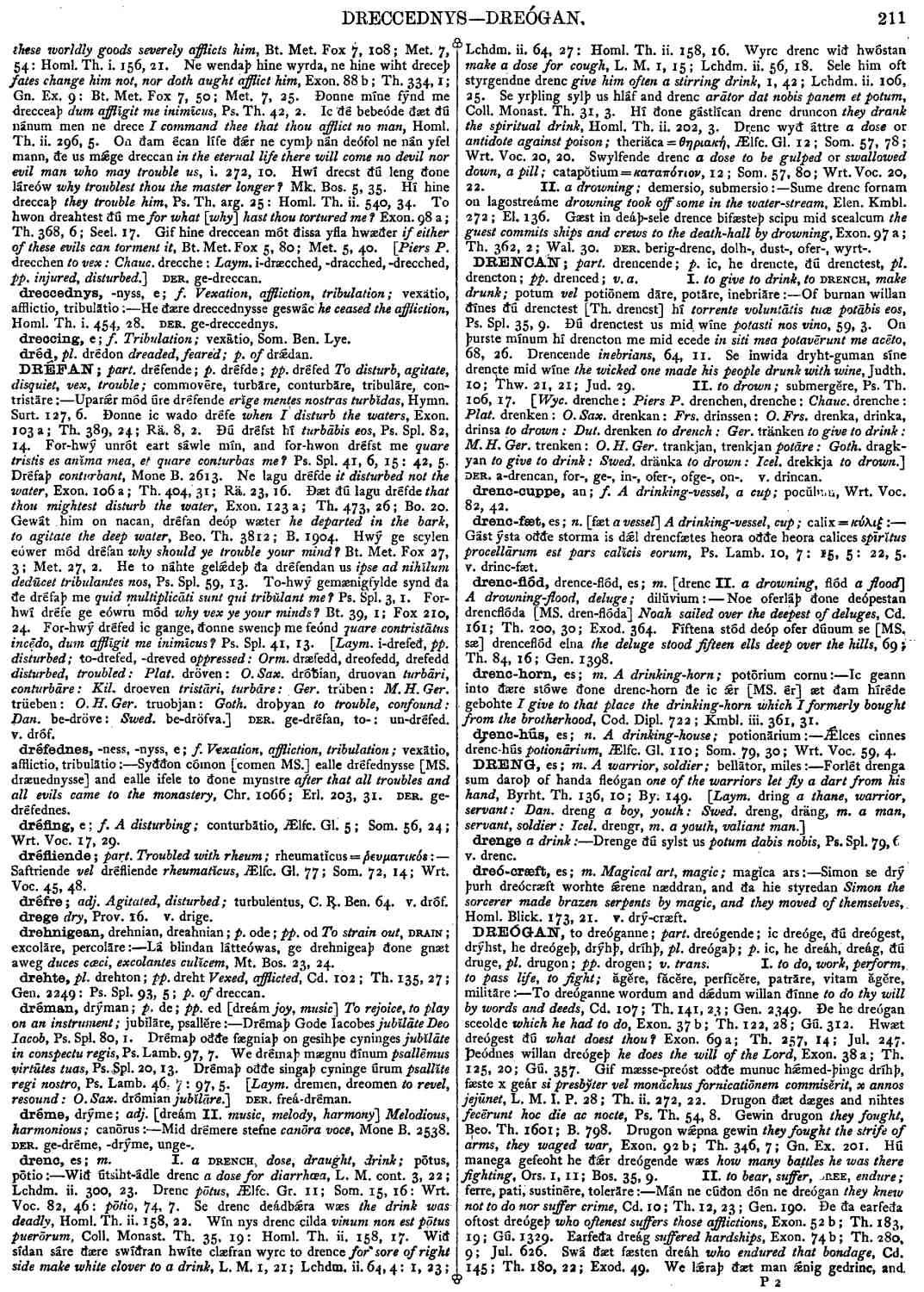DREÓGAN
- verb [ strong ]
-
To dreóganne wordum and dǽdum willan ðínne
to do thy will by words and deeds,
- Cd. 107 ;
- Th. 141, 23;
- Gen. 2349 .
-
Ðe he dreógan sceolde
which he had to do,
- Exon. 37 b ;
- Th. 122, 28;
- Gú. 312 .
-
Hwæt dreógest ðú
what doest thou?
- Exon. 69 a ;
- Th. 257, 14;
- Jul. 247 .
-
Þeódnes willan dreógeþ
he does the will of the Lord,
- Exon. 38 a ;
- Th. 125, 20;
- Gú. 357 .
-
Gif mæsse-preóst oððe munuc hǽmed-þingc dríhþ, fæste x geár
si presby̆ter vel monăchus fornicatiōnem commisĕrit, x annos jejūnet,
- L. M. I. P. 28 ;
- Th. ii. 272, 22.
-
Drugon ðæt dæges and nihtes
fecērunt hoc die ac nocte,
- Ps. Th. 54, 8.
-
Gewin drugon
they fought,
- Beo. Th. 1601 ;
- B. 798 .
-
Drugon wǽpna gewin
they fought the strife of arms, they waged war,
- Exon. 92 b ;
- Th. 346, 7;
- Gn. Ex. 201 .
-
Hú manega gefeoht he ðǽr dreógende wæs
how many battles he was there fighting,
- Ors. 1, 11;
- Bos. 35, 9.
-
Mán ne cúðon dón ne dreógan
they knew not to do nor suffer crime,
- Cd. 10 ;
- Th. 12, 23;
- Gen. 190 .
-
Ðe ða earfeða oftost dreógeþ
who oftenest suffers those afflictions,
- Exon. 52 b ;
- Th. 183, 19;
- Gú. 1329 .
-
Earfeða dreág
suffered hardships,
- Exon. 74 b ;
- Th. 280, 9;
- Jul. 626 .
-
Swá ðæt fæsten dreáh who endured that bondage, Cd. 145; Th. 180, 22; Exod, 49, We lǽraþ ðæt man ǽnig gedrinc, and ǽnig unnit ðár ne dreóge
we teach that man suffer not there any drinking, nor any vanity,
- L. Edg. C. 28 ;
- Th. ii. 250, 14.
-
He sibbe dreáh
he enjoyed peace,
- Cd. 130 ;
- Th. 165, 28;
- Gen. 2738 .
-
Symbel-wynne dreóh
enjoy the pleasure of the feast!
- Beo. Th. 3569 ;
- B. 1782 .
-
Nǽnig manna wát hú mín hyge dreógeþ, býsig æfter bócum
no man knows how my mind is employed, busy over books,
- Salm. Kmbl. 122, MS. B ;
- Sal. 60 .
-
Dreógan, inf. Cd. 104; Th. 137,
- 31 ;
- Gen. 2282 .
-
Dreág, p. Exon. 53 a; Th. 185,
- 5; Az. 3.
Bosworth, Joseph. “DREÓGAN.” In An Anglo-Saxon Dictionary Online, edited by Thomas Northcote Toller, Christ Sean, and Ondřej Tichy. Prague: Faculty of Arts, Charles University, 2014. https://bosworthtoller.com/7904.
Checked: 1